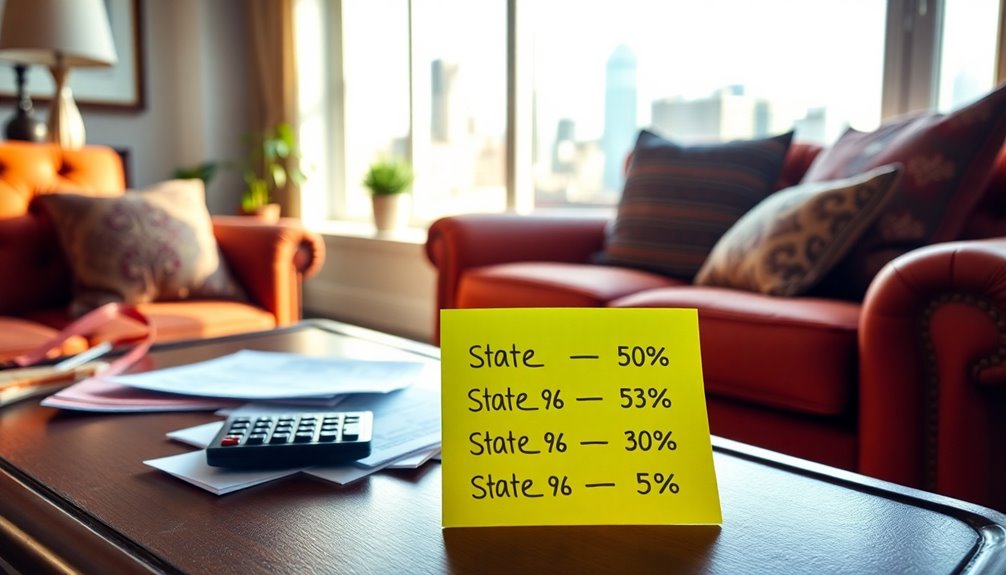Rent payments for residential properties typically can't be deducted from your federal income taxes. However, if you're self-employed and use part of your home for business, you might be able to deduct that rent. Some states do offer tax credits or deductions for renters, depending on specific criteria like income and residency duration. For instance, states like California and New York provide limited credits for qualifying renters. While federal rules are strict, it's worth exploring state options to understand what you might qualify for. You might find more useful information on this topic ahead.
Key Takeaways
- Federal tax rules do not allow deductions for residential rent payments on your income taxes.
- Self-employed individuals can deduct rent for business use if the space is exclusive for that purpose.
- State-specific rent deductions and credits are available in some states, with varying eligibility criteria.
- California, New York, Indiana, and New Jersey offer renter tax credits or deductions based on income and residency duration.
- Renters cannot claim rent deductions if they are claimed as dependents on another person's tax return.
Federal Tax Rules on Rent

When it comes to federal tax rules on rent, it's important to know that you can't deduct your residential rent payments from your federal income taxes. This rule is absolute, meaning there are no exceptions or special provisions that allow you to claim a deduction for rent.
Unlike homeowners who can deduct mortgage interest, property taxes, and certain home improvement costs, renters don't have that benefit. Additionally, it's worth noting that home office deductions are available for those who are self-employed and use a rented space for business purposes.
If you're self-employed or own a business, though, you may have some options related to rent. For instance, if you're using a rented space exclusively for business purposes, you can deduct those expenses.
You can choose between the simplified method, allowing $5 per square foot up to 300 square feet, or the actual expense method, which requires prorating expenses based on the business use of the space.
State-Specific Rent Deductions

Several states provide rent deductions or credits that can significantly reduce your tax liability if you qualify.
For instance, in California, you could get a tax credit between $60 and $120 if you paid rent for at least half the year and meet specific income thresholds. Single filers earning under $50,746 and married filers under $101,492 may qualify. Additionally, self-employed individuals may also benefit from potential rent deductions if their home office meets IRS criteria.
In New York, you might be eligible for a credit of up to $375, but you'll need to have lived in the same rental for at least six months, with an average monthly rent of $450 or less.
In Indiana, you can deduct up to $3,000 of rent paid on your primary residence, while in New Jersey, renters can claim up to 18% of rent paid as property tax or a $50 property tax credit.
Eligibility for Rent Credits

To qualify for rent credits, you must meet several eligibility criteria that vary by state. First, you need to be a resident of the state where you pay rent and have lived in your residence for a specified period—often at least six months. Additionally, you can't be claimed as a dependent on someone else's tax return.
Income requirements also play a crucial role. For instance, in New York, your gross income must be $18,000 or less. In Washington D.C., your adjusted gross income should be $61,300 or less, or $83,700 if you're 70 or older. Each state has its own thresholds, so check your local guidelines. Renters tax credits can provide significant financial relief for those who qualify.
Moreover, the rent must be for your primary residence, and it can't be for properties exempt from real property taxes, like public housing.
Some states also cater to specific demographics, offering additional credits for individuals aged 65 or older or those with disabilities. Familiarizing yourself with these factors will help you determine if you qualify for rent credits in your state.
Reporting Rent Deductions

Reporting rent deductions accurately is crucial for maximizing your tax benefits as a property owner. To start, you'll need to report your rental income on Form 1040 or 1040-SR, using Schedule E. On this schedule, list total income, expenses, and depreciation for each rental property. If you own three or more properties, attach a separate Schedule E for each one.
Be sure to include all scheduled rent payments you received during the year, including any advance rent. Remember, security deposits aren't included unless they're non-refundable. If you received lease cancellation fees or payments from a lease with an option to buy, count those as rental income as well.
When it comes to deductible expenses, you can deduct mortgage interest, operating expenses, and real estate taxes. Additionally, ordinary and necessary expenses for property management can also be deducted, ensuring you maximize your tax benefits.
Don't forget about repair costs, maintenance, utilities, and professional fees—like bookkeeping or legal services. You can even deduct advertising costs for your property.
If you're using the property for both rental and personal purposes, divide your expenses based on square footage or the number of rooms to determine the rental use percentage. Keep detailed records of all your deductible expenses to support your claims.
Limitations on Rent Deductions

Understanding the limitations on rent deductions is key for renters and homeowners alike. At the federal level, there's no deduction for residential rent. Homeowners can deduct mortgage interest, property taxes, and some home improvement costs, but renters miss out on these benefits unless they use their home for business.
If you work from home, you can deduct rent, but only if the space is used regularly and exclusively for business. You'll need to prorate your deduction if you mix personal and business use. Additionally, certain business entities may also be eligible to deduct rent, which can provide an advantage for specific taxpayers.
State-specific limitations also come into play. Only 22 states offer renter's tax credits or deductions, each with unique eligibility criteria. For instance, California has income thresholds you must meet to qualify, and benefits are often minimal.
Additionally, some states require that landlords pay property taxes for you to be eligible for any deductions.
Lastly, many state deductions are limited to certain demographics, like age or disability status. Be sure to check your state's requirements to see if you qualify. Knowing these limitations will help you navigate your tax situation effectively.
Frequently Asked Questions
Can I Deduct Rent if I Work From Home?
If you're working from home, you can potentially deduct a portion of your rent, but there are specific requirements.
Your workspace must be used regularly and exclusively for business. You'll need to calculate the business-use percentage based on the size of your workspace compared to your entire home.
Keep detailed records of your rent payments and ensure you're self-employed or have 1099 income to qualify for the deduction.
Are There Tax Benefits for College Students Paying Rent?
If you're a college student paying rent, you mightn't find direct tax benefits for your rent payments.
However, you can potentially deduct student loan interest for loans used to cover education expenses, including room and board, up to certain limits.
Additionally, some states offer tax credits for renters, especially for low-income individuals.
Always check your state's specific regulations to see if you qualify for any benefits that could ease your financial burden.
How Does Rent Affect My Overall Tax Refund?
Rent can significantly affect your overall tax refund.
Higher rental expenses might lower your taxable income, but that doesn't always guarantee a bigger refund.
If your rental expenses reduce your qualified business income
Can I Claim Rent if I Share an Apartment?
If you share an apartment, claiming rent on your taxes can get tricky.
Generally, you can't deduct your portion of the rent unless you're self-employed and use part of your space exclusively for business.
If you rent out a room, you can deduct related expenses, but you'll need to divide costs between personal and rental use.
It's best to keep detailed records to ensure you get the most accurate deductions possible.
What Happens if My Landlord Pays My Rent Directly?
If your landlord pays your rent directly, it typically counts as income for them.
You'll need to check your lease agreement, as it might affect how you report your living situation.
Ensure you communicate with your landlord about any changes to payments.
Additionally, keep records of any agreements or arrangements made, as this will help clarify responsibilities and ensure compliance with tax regulations.
Conclusion
In conclusion, while rent generally isn't deductible on your federal taxes, you may find some opportunities at the state level or through specific credits. It's crucial to check your state's rules and ensure you're eligible for any benefits. Always keep accurate records and report any deductions correctly to avoid issues. If you're uncertain, consulting a tax professional can help you navigate your options and maximize your potential savings. Don't miss out on what you might qualify for!









